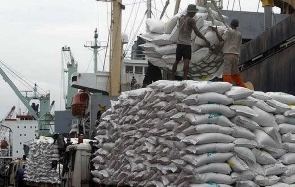Ghanaians' taste for foreign products keeps increasing and changing for the worse, as this translates to the high import rate the country has recorded.
The country, now noted to be import-dependent, imported items totaling about US$13.7 billion in 2023.
Reports have shown that Ghana imported tinned tomatoes worth US$1 billion, toilet rolls at US$100 million, soap and cosmetics worth US$200 million, and tomatoes from Burkina Faso at US$100 million.
Additionally, cars and spare parts imported into the country cost around US$200 billion, tiles and ceramics US$200 million, and cooking oil US$300 million.
Other imported items include medicine, raw materials, household items, and electrical appliances.
The high import dependency pushed inflation to a record high and increased pressure on the local currency, the cedi.
This has been a major concern for some Ghanaians, especially the business community, as they strive to meet the country’s high demand for certain products.
Many have questioned when the importation of some basic commodities will end, as these items listed below can be produced in Ghana.
Speaking on this concern that has become a canker, the General Secretary of the Traders Advocacy Group Ghana (TAGG), Nana Opoku Acheampong, in an interview with Graphic Business, said Ghana’s reliance on imports for essential goods across industries highlighted the country’s challenge with sourcing raw materials for local production.
According to him, local industries have to have access to the raw materials they need to produce and also meet the high demand of the country.
“The lack of raw materials is hampering production across sectors. To compete effectively with imported goods, it is critical that our local industries have access to the raw materials they need, sourced within the country,” he said.
He called on the government to prioritise policies that will give enough room for local businesses to operate and thrive.
The TAGG general secretary added that a regulation to protect local traders and manufacturers is needed to help drive the government’s industrialisation agenda.
“We need policies that support local production, not just the importation of raw materials, which often cost more than the finished products from abroad. Research institutions like the Council for Scientific and Industrial Research (CSIR) must work to find substitutes for imported raw materials to make local manufacturing more competitive,” Acheampong stated.
“It is time for policymakers to stop toying with the trading community and start investing in Ghana’s future through sustainable local production,” he added.
Ghana’s total trade value for the second quarter (Q2) of 2024 stood at GH¢123.0 billion, comprising GH¢64.2 billion in exports and GH¢58.8 billion in imports.
The country recorded a trade surplus of GH¢5.4 billion, marking a substantial reversal from a deficit of GH¢3.1 billion recorded in the same period in 2023. In US dollar terms, the total trade amounted to $9.0 billion.
Government Statistician, Professor Samuel Kobina Annim, speaking at the release of the Ghana Statistical Service (GSS) Q2 trade statistics on export and import inflows, values, and price changes, said the findings highlight a trade surplus, driven by a notable increase in the export of gold.
He said Asia remained Ghana’s leading trade partner, contributing over half of the country’s imports and half of its exports in Q2 of 2024.
SA/MA
Watch the latest edition of BizTech below:
Click here to follow the GhanaWeb Business WhatsApp channel
Click to view details



Business News of Tuesday, 17 December 2024
Source: www.ghanaweb.com

















